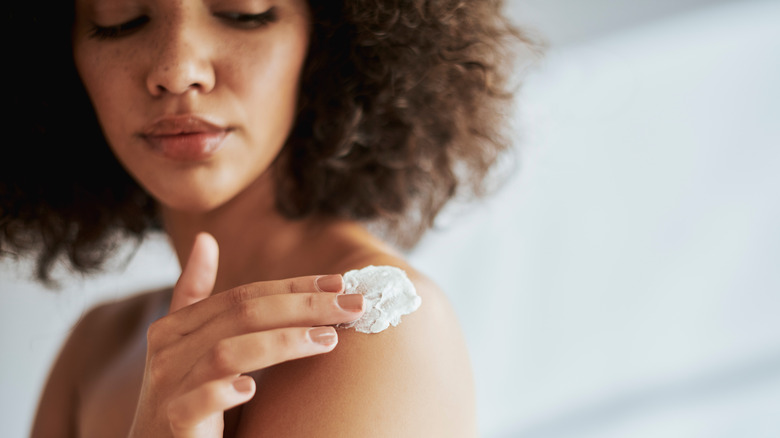Is Isoparaffin Safe For Skincare? Here's What We Know
If you feel like the topic of skincare has become a much more popular one over the past several years, you're not imagining it. Between influencers touting the latest "it" product to companies making advances in anti-aging products and cancer-preventing sunscreens, it seems like skincare is everywhere. Because it is. Skincare has become a multi-billion dollar business that is projected to keep growing steadily in the coming years (via Yahoo! Finance). And while finding the latest and greatest product or brand for your specific skin concern can feel like a major win, it's always important to pay attention to the ingredients.
At the same time that skincare products have skyrocketed in popularity, there has also been a cultural shift toward cleaner, greener, safer ingredients in cosmetics and skincare. The Environment Working Group, for instance, has a whole database set up just for searching ingredients and products to learn their level of safety or toxicity.
So, when you read about a skincare ingredient that is being touted as the holy grail for a certain problem, concern, or goal, it's natural to ask yourself not only if it actually works, but if it's safe. One ingredient that is found in a wide array of skincare products is isoparaffin, which many claim is wonderful for keeping skin moisturized, plump, and feeling fresh. So what are the benefits to isoparaffin, and is it safe to use? Here's what we know about the ingredient.
All about isoparaffin
Isoparaffin is derived from petroleum, and is a mixture of saturated hydrocarbons (mineral oils) often used as an emollient ingredient in skincare (via Byrdie). Isoparaffin appears in countless body care products from lip balms to body lotions to eye creams to deodorant sticks, and its presence in these products serves a dual purpose. First and foremost, isoparaffin is an effective moisturizing agent that can help repair the skin barrier, prevent moisture loss, and keep skin feeling plump and healthy, all while feeling lightweight. At the same time, it helps in the formulation of lotions and creams by adding a rich, creamy texture.
But is it safe for your skin and your overall health? The good news is that the Environmental Working Group (EWG), which ranks ingredients from 0-10 with ten being the most potentially toxic and harmful, ranks isoparaffin at a 1 (via EWG). With regard to the most common safety concerns including cancer, allergies, toxicity, and use restrictions, the EWG says isoparaffin presents a "low" risk for every one of these concerns.
That said, there are a few things you should know about isoparaffin so you can make the best choice for yourself as to whether or not you want to use it on your own skin.
What to know if you have acne or sensitive skin
While isoparaffin is non-comedogenic, meaning it will not clog pores, if you are someone who struggles with acne or similar skin concerns, you may want to steer clear of this ingredient anyway. Isoparaffin does not break down easily, so while it will not clog your pores on its own, it could potentially trap other ingredients, oil, or bacteria in pores (via Byrdie).
Further, while isoparaffin is considered a non-irritating substance, allergies to this popular ingredient are not impossible. As such, if you have sensitive skin or are concerned, doing a patch test is a good way to see how your skin will respond. Simply place a small amount of the product on a place like the inside of your wrist, and see if you get any type of reaction over the coming day or so. If you don't, it is unlikely you are allergic to isoparaffin, and can continue using the products you love that contain the ingredient.


